- Startseite
- Forschung & Transfer
- Forschungsprojekte
- Mediating Islam in the Digital Age (MIDA), Work Package "Contested Authority and Knowledge Production"
Mediating Islam in the Digital Age (MIDA), Work Package "Contested Authority and Knowledge Production"
Work Package 4 ‘Contested Authority and Knowledge Production’ deals with the construction and transformation of religious authority and religious knowledge production in changing circumstances. It addresses questions of legitimacy, power and discipline. The Work Package is part of the Marie Curie Initial Training Network ‘Mediating Islam in the Digital Age’ (MIDA), coordinated by the ‘Centre National de la Recherche Scientifique’ (CNRS).
EC. Horizon 2020, 2019-2023
Team
Kooperationspartner
Leitung
Forschungsfragen
The Marie Curie Initial Training Network ‘Mediating Islam in the Digital Age’ (MIDA), coordinated by the ‘Centre National de la Recherche Scientifique’ (CNRS) rests on the premise that digitisation and technological innovation do have a tremendous impact on Islam, the effects of which are diverse and ubiquitous, and they are reminiscent of technical revolutions in the past such as print technology. The rapid changes that are already occurring are generating a sense of loss of control and instability among the general public, politicians, journalists, academics, and, not least, among Muslims themselves. The spread of modern digital media and new technologies of communication, production and dissemination, prompts researchers and social actors, Muslims and non-Muslims alike, to make sense of and understand these developments.MIDA assesses these developments in all their dimensions by formulating three major questions: How does digitisation (1) shape Islam (i.e. beliefs, practices, societies, political organisations, social institutions, and outlooks); (2) modify the relations Muslims have with their past; (3) modify and reorganize scholarship and research on Islam?The goals of the Work Package “Contested Authority and Knowledge Productions” are to study the ‘democratisation’ of knowledge production, the emergence of new audiences and discursive communities, the delocalisation, subjectivation, and fragmentation of authority, as well as the new forms of community building, online and offline. Specific objectives are: * To analyse the notion of authority in the networks of transmission of Islamic knowledge and the mobility patterns of scholars (past and present); * To analyse the shifting relations between real and digital construction and deconstruction of religious authority and knowledge as well as the conflicts that accompany, and result from, these shifting relations; * To determine whether online discussions and communities are related to offline activities in practices, beliefs and/or official organisations; * To map and analyse the rapidly changing landscape of Islamic knowledge production and to identify the various actors involved; * To analyse the role of women in the transmission of knowledge production and contestation of the authority.
Beitrag zu internationaler Forschung
The MIDA project sets out to research the challenges today’s Islamic world is exposed to due to the rise of new technologies in the digital era. It thus not only explores a global phenomenon but also a phenomenon that is of global importance, both in terms of real-world problems and academic research. The Work Package “Contested Authority and Knowledge Productions” deals with the construction and transformation of religious authority and religious knowledge production in changing circumstances. It addresses questions of legitimacy, power and discipline. Muslims have held varying, sometimes conflicting, views on the extent to which knowledge and authority are exclusive to a single figure or a male ‘professional’ group, or distributed in society, on how knowledge should be transmitted and controlled, and the literary forms that it should take, and on how it should be reproduced. This is certainly not a novel issue. It is therefore important to compare cases in the past with recent developments. Questioning ‘established’ religious authorities and addressing new audiences is as old as Islam, but digitisation has intensified this process in an unprecedented way. Research in the Work Package will contribute to a better understanding of these developments.
Forschungsdesign und Methoden
The Work Package “Contested Authority and Knowledge Productions” includes the following tasks: * Task 1: Data-mining techniques and visualisations used in Research Intelligence; * Task 2: Studying (online) activities (online fieldwork), texts and carrying out semi-structured interviews; * Task 3: Analysing the transfer networks based on bibliographic data and web educational programs.



